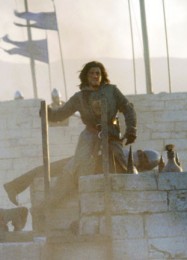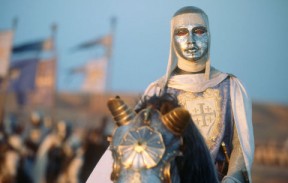|
Kingdom of Heaven
At the end of Kingdom of Heaven,
a caption updates us as to the status of Jerusalem in the
21st Century. It may be the understatement of the year in
its characterization of the region as still "unresolved."
If anyone in the audience is surprised by that bit of information,
then they probably wandered into the wrong movie.
The real surprises in director Ridley Scott's
latest historical epic are two-fold: that ever there was
a time during the Crusades when a Christian King of Jerusalem
tried to maintain peace between Muslims and Christians,
and that in this time of distrust, the agnostic filmmaker
has created a film with a solid spiritual message - a peaceful
one at that.
To get to that point, however, Kingdom
of Heaven still jumps through a lot of hoops that make
it appear by-the-numbers at first.
In a standard Hollywood epic, true evil
can not appear to be mundane. If it appears in a low status
character, that one must be craven, tending to wild eyes
and generally snivelly behavior. Such it is with the village
priest (Michael Sheen) that robs the corpse of a suicide
that he has been charged with burying. High status evil,
of course, must mince and prance, as the French Crusader
Guy de Lusignan (Martin Csokas) does with relish. He even
slowly undulates his hips as if climaxing before slitting
the throat of a Muslim messenger.
Despite the prevalence of evil Christians,
Scott and screenwriter William Monahan balance their picture
out with noble men that truly get what religion is supposed
to be about - on both sides. The protagonist Balian (Orlando
Bloom) seeks forgiveness, as does his deadbeat dad Godfrey
(Liam Neeson). Though their relationship rushes and bows
to the needs of the story, clearly both men understand the
message.
"Protect the kingdom," Godfrey urges his
son, "and failing that, protect the people." With those
words, Balian finds his purpose. Though he becomes a more
than competent knight much too suddenly (and yet, isn't
it a blessing to be spared a montage?), his drive and honest
heroism moves the film surprisingly well. Yes, Orlando has
finally played a MAN in a movie. Don't worry, girls, he
still has those moist doe eyes.
Said eyes move Guy's wife Sibylla (Eva
Green) to adultery, a momentary lapse in Balian's character
for he seeks forgiveness for his wife's suicide. It becomes
complicated knowing that Sibylla is also the sister of the
King of Jerusalem, the leper Baldwin.
And no, that's not a lost Baldwin brother.
The role is actually played by one of America's top actors,
but it would ruin the surprise to reveal who lurks beneath
the silver mask. Suffice to say the performance works incredibly
well.
Aside
from the villains, including a ridiculously over the top
Brendan Gleeson, all the acting works well. Jeremy Irons,
unfortunately saddled with a leonine scar, delivers an understated
and powerful performance as Tiberias, a Crusader struggling
internally with the Templars' intolerance.
The
biggest revelation, thought it may do him little good, comes
from Alexander Siddig as the Muslim noble Nasir. Yes, Dr.
Bashir from Deep Space Nine bulked up and owns the
movie every time he walks on screen. Sorry, Orlando.
Of course, no epic would be complete without
battle scenes and sieges. As a director, Scott is a master
of such scenes, and delivers some of the most watchable
battles in a few years that have brought us a lot of man
to man clashes. Still, we have seen many recently, (featuring
Orlando Bloom, in fact), so it gets hard not to grow impatient
for the magical elephant things to appear and start tossing
soldiers around.
The power of the message overcomes all
its shortcomings. When the summer movie season officially
begins, it's always reassuring when a thoughtful film sneaks
in disguised as a blockbuster.
Rating: 
|








